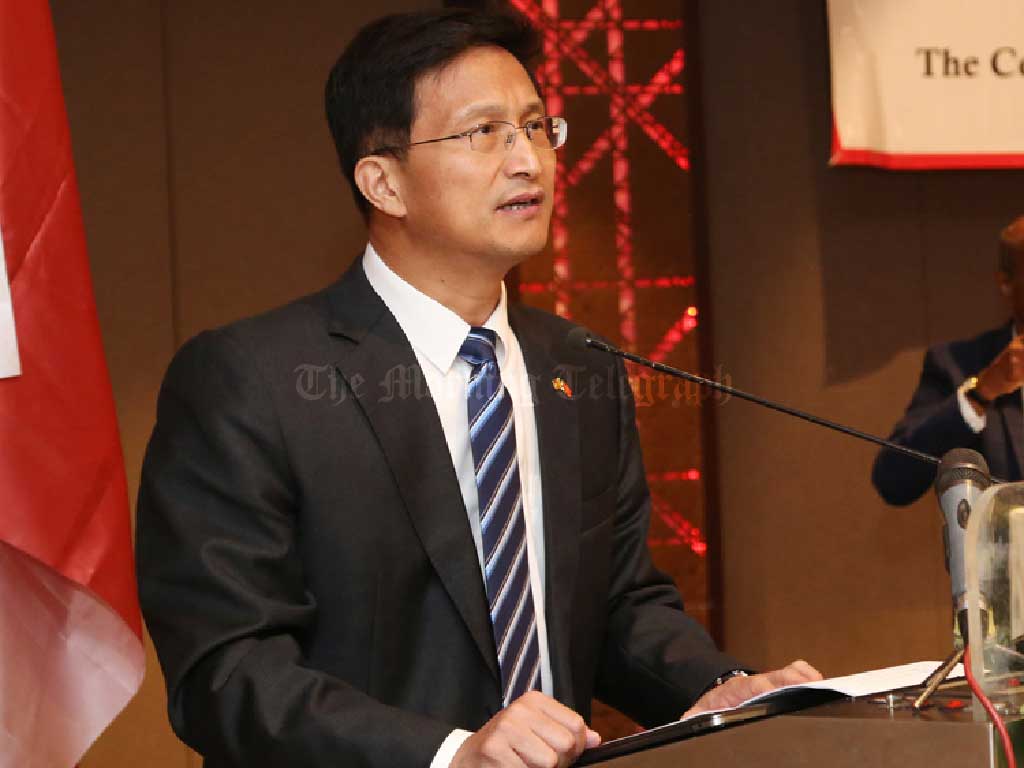
The relationship between Sri Lanka and China has seen its share of tensions recently, with some parties questioning the nature of Chinese investments in Sri Lanka. However, Chinese Ambassador Qi Zhenhong reaffirmed China’s commitment to supporting Sri Lanka through its economic struggles, stressing that Sri Lanka must navigate its future with confidence and maintain an independent foreign policy.
Speaking to the media in Colombo, Ambassador Qi addressed concerns raised by critics of China’s involvement in Sri Lanka, particularly accusations that Chinese projects in Sri Lanka were “white elephant” ventures—unnecessary and costly infrastructure projects that ultimately fail to deliver. He emphasized that such allegations were unfounded, clarifying that all Chinese investments in Sri Lanka had been made at the request of previous Sri Lankan governments.
Emphasis on Sri Lanka’s Sovereignty and Self-Reliance
Qi strongly urged Sri Lanka to resist external pressures and maintain control over its own economic destiny. He rejected the notion that Sri Lanka required the support of other countries to overcome its economic crisis, instead advocating for the country to rely on its own strength and deepen relations with friendly partners, particularly China. “Sri Lanka should not bow to outside pressures. The Sri Lankan people should have confidence in themselves and look to strengthen their relationship with friends like China,” he said.
Addressing Past Strains and the Future of Bilateral Relations
The Ambassador did not shy away from addressing past strains in the relationship, particularly between China and the former Sri Lankan government. Qi expressed disappointment when the former government rejected China’s request to allow a Chinese research vessel to dock in Sri Lankan waters, especially when a similar vessel was welcomed in the Maldives. He also reflected on the challenges that arose during this period, calling it a regrettable chapter in the long history of Sri Lanka-China relations.
However, Qi expressed optimism for the future, especially following the election of a new government in Sri Lanka. He sees the new administration as a fresh start for bilateral cooperation. “With the victory of the new government, Sri Lanka has opened a new chapter. China has full confidence in the future of Sri Lanka,” he said.
Chinese Investments: ‘White Elephant’ or Strategic Assets?
The Ambassador addressed the ongoing criticism of Chinese-funded projects, specifically highlighting major infrastructure developments such as the Lotus Tower, the Hambantota Port, and the Colombo Port. Critics often label these as “white elephant” projects, accusing China of investing in non-profitable ventures. However, Qi disagreed with this assessment, stating that these projects were initiated at the request of the Sri Lankan government and had been mischaracterized by critics.
He pointed to the Lotus Tower, which he said had begun to generate profits after being leased to a private company, positioning it as a symbol of Sri Lanka’s progress. Similarly, the Hambantota Port and Colombo Port have generated significant revenue for Sri Lanka, according to Qi, though their success depends on the effective management and utilization by local authorities.
“Some former parliamentarians call these projects ‘white elephant projects,’ but these claims are baseless,” Qi stated. He argued that the underperformance of these projects was largely due to mismanagement on the Sri Lankan side, not the nature of the investments themselves.
Debunking the ‘Debt Trap’ Myth
A persistent narrative against Chinese involvement in Sri Lanka is the allegation of a “debt trap,” with critics claiming that China’s loans to Sri Lanka could lead to unsustainable debt burdens. Qi vehemently denied this, asserting that there was no such thing as a “debt trap” in China’s dealings with Sri Lanka. He reminded the public that China, despite being a developing country itself, extends loans and investments to Sri Lanka based on the strong historical friendship between the two nations.
He further stressed that when lending, the responsibility lies not with the lender but with the borrower, who must use the loan effectively. “The one who does not know how to use the loan properly should be blamed,” he said.
The Free Trade Agreement (FTA) and Economic Cooperation
Qi also addressed concerns surrounding the stalled Free Trade Agreement (FTA) negotiations between China and Sri Lanka. While negotiations have been ongoing for several years, the agreement has yet to be finalized. Some parties in Sri Lanka fear that an FTA with China could lead to an imbalance, with China taking advantage of Sri Lankan markets.
To counter these fears, Qi assured that if Sri Lanka felt that the FTA was disadvantageous, it could adjust the agreement after a year. He also pointed out that many countries would benefit from such an agreement, not just Sri Lanka, and that accusations of China taking advantage of Sri Lanka were misleading.
Moving Forward: Financial Strategy and Debt Management
On the broader economic situation in Sri Lanka, Qi advised the country to reach an agreement with its creditors to avoid further financial distress. He highlighted the need for Sri Lanka to address its old debts before taking on new ones, cautioning that continued borrowing could become a long-term burden.
“Some lenders are using the situation to their advantage, charging higher interest rates from Sri Lanka,” he warned, emphasizing that Sri Lanka needed to carefully manage its financial obligations to avoid worsening its economic crisis.
A Strategic Partnership for the Future
Ambassador Qi concluded by reaffirming that China remains committed to supporting Sri Lanka, both economically and diplomatically. While acknowledging past challenges, he expressed confidence in the future of the Sri Lanka-China relationship, emphasizing that both nations should work together to build a stronger and more mutually beneficial partnership.
By maintaining an independent foreign policy and strengthening ties with China, Sri Lanka can overcome its current economic difficulties and chart a prosperous path forward, Qi believes.




